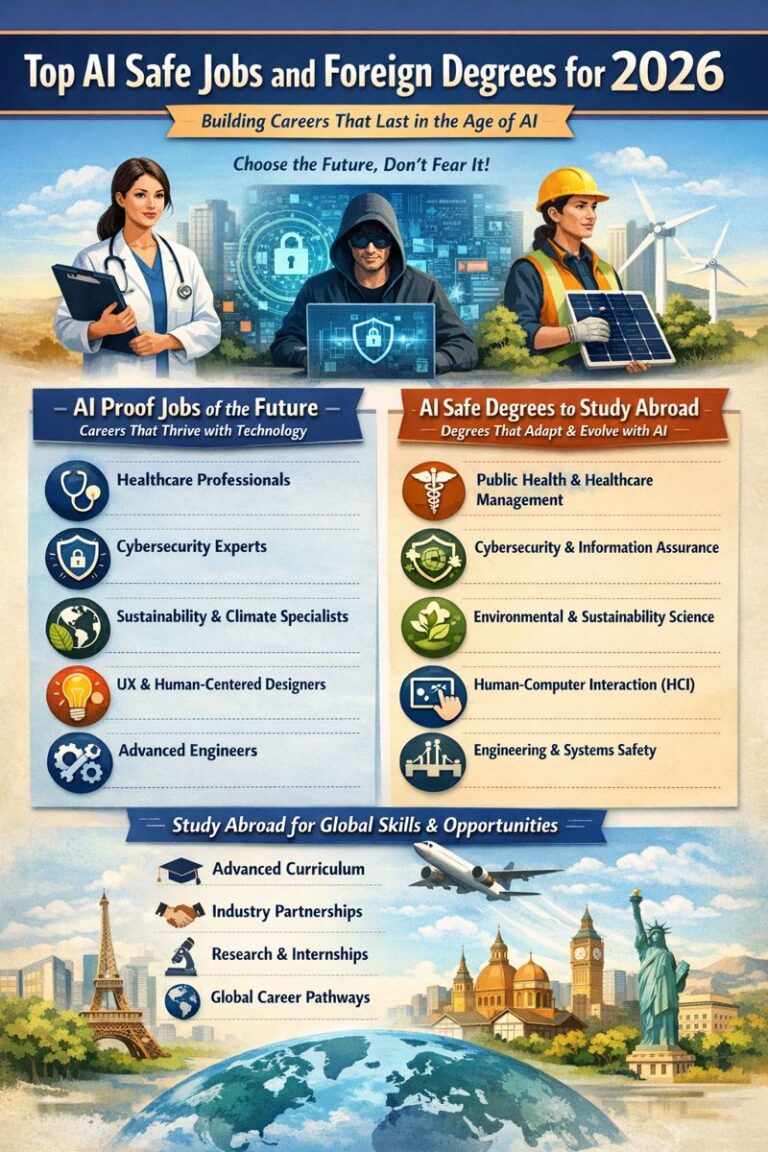Product Management is one of the most in-demand careers today. Juxtaposed between technology and user experience, product managers work as mini-CEOs. They mastermind the development and launch of products that address real-world problems.
For students getting their masters abroad, shifting to product management is a smart and viable choice. Use your master’s degree to transition to product management. Let’s discuss how.
Why product management is a lucrative career path
Product managers develop a product vision and build a roadmap to achieve it. The role involves innovation, leadership, and strategy. It integrates technology with business objectives and requires creative problem-solving skills. Here’s why it makes a lucrative career path:
High Demand Across Industries
The need for qualified product managers exists everywhere, including technology, healthcare and e-commerce. Recent data from the U.S Bureau of Labor Statistics projects a 7% growth in project management roles from 2023 to 2033. This exceeds the average growth rate of most other jobs. The same data also projects 77,000 openings every year in this field. LinkedIn’s 2023 “Jobs on The Rise” report also featured product operations manager as one of the fastest-growing job roles.
Attractive Salary Package
Product managers attract some of the best payment packages in the world. As of May 2024, the average annual wages for a project management specialist were $100,750 (U.S Bureau of Labor Statistics). In Canada, the average salary for product managers is CAD 92,804 per year. In India, a product manager earns an average salary of ₹11,48,889 annually. In most countries, the average project management salary far exceeds the annual national average salary.
Dynamic Work Environment
The role of a product manager is multi-faceted, with cross-functional collaboration. The position demands strategic thinking, stakeholder communication, data analysis and market research. This setting guarantees that no two days are alike, with a perpetual scope for learning and development.
Career Growth & Leadership Opportunities
A product manager will have exciting career opportunities to scale the corporate ladder. Most transitions are to higher management positions like VP, Director or even Chief Product Officer (CPO). Experienced product leaders are highly valued by organisations and are compensated as such. Research indicates that the average salary of a VP of product management is USD 175,000 annually (2025 data).
How a Master’s degree abroad helps in transitioning to product management
A master’s degree abroad can greatly enhance your chances of landing a product manager role. Apart from improving your educational credentials, it equips you with the skillsets, contacts and global exposure needed to navigate this role.
Global Curriculum with Industry-Relevant Skills
Students pursuing Master’s programs abroad enjoy a curriculum designed to reflect industry standards. A degree in business, computer science, or UX design includes training in agile product lifecycle management, user research, and analytics.
Access to Top-Notch Internships and Job Markets
Most universities maintain active partnerships with MNCS and startups. Internships, often included in a master’s program, help you build your product portfolio for interviews. Relevant internships and co-op programs often lead to full-fledged employment in product management.
Exposure to a Diverse, Cross-Functional Environment
Product management is a versatile role, demanding cross-functional skill sets. On the other hand, international campuses act as a hot spot for cultures and disciplines. While you are working on a group project with your peers, you’re actively gaining experience in handling diverse teams. You also learn how to balance user needs and business priorities, something that is valued highly by global employers.
Development of Soft Skills and Strategic Thinking
Studying abroad means constantly navigating unknown territories. Every day, you have to deal with unfamiliar situations and interact with a myriad of people. The life skills that you learn in your study abroad program often directly translate to leadership skills required for the PM role. It trains you to improve your communication and interpersonal skills. It also enhances your ability to adapt and manage stress while multitasking.
Strong Alumni and Career Networks
Numerous foreign universities have strong alumni networks in leading MNCS and startups. University placement departments often host networking events, PM bootcamps, workshops and mock interviews. Proper networking can help you get in touch with mentors and hiring managers who can help you land a PM role.
Visa Pathways and Global Recognition
A master’s degree from abroad increases your chances of getting an international work visa. Canada, Australia, and Germany offer easy post-study work permit avenues after your graduation. Furthermore, a study abroad degree increases your employability score in international markets.
Best Master’s programs for aspiring product managers
For individuals looking to enter product management, the right master’s program is important. An effective course not only provides relevant skills but also gets you connected with leading tech companies and real-world opportunities.
MBA (Master of Business Administration)
An MBA is among the most common routes into product management. Some of the best schools are Stanford, Harvard, Wharton, INSEAD, and London Business School. MBAs focus on strategy, marketing, and leadership—critical areas for PMs. Some schools even have specific product management courses or electives.
Master’s in Product Management
Some universities provide MS degrees with a specialisation in product management. Two such institutions are Carnegie Mellon University (CMU) and the University of Maryland. These courses are specifically designed for future PM roles. The curriculum usually includes topics on agile methods, UX research, and roadmapping. It also includes real-life projects and internship opportunities.
MS in Computer Science or Engineering Management
A technical master’s degree from a reputable institution is a good bet if you are gunning for PM jobs, especially in software, AI, or product-based engineering companies. This equips you to know what makes the developer’s brain work and understand what technical lingo to speak. Some of the top institutes for such programs are MIT, UC Berkeley, and ETH Zurich.
MS in UX Design or Human-Computer Interaction (HCI)
If you are passionate about creating user-centric design, a master’s in UX design or HCI is a great option. These programs prioritise design thinking, consumer psychology, and usability testing. All these skills can be leveraged to add value and credibility to your PM role.
Key skills needed to succeed in product management
Product Management is a dynamic role that needs a diverse range of skill sets to make strategic decisions. A product manager should be able to master different attributes and skill sets within the role.
Product Management Transition Tips
Technical Proficiency
Although not compulsory, a basic knowledge of software engineering, API protocols, databases, and systems architecture is quite useful. This kind of technical know-how helps a PM engage with engineers. It also enables him to check the feasibility of various technical ideas and take product-centred decisions.
Business Acumen
The job of a product manager is to align product strategies with business objectives. He needs to manage budgets, evaluate ROI, and conduct cost-benefit analysis. An entrepreneurial mindset is of critical value.
User Empathy & Design Thinking
A successful product addresses the core needs of users. A product manager should have a basic understanding of user psychology. He should be able to map user journeys and use design thinking to create a unique user experience.
Communication & Leadership
A product manager often leads without any direct control. He should have excellent communication, interpersonal, and negotiation skills. He should also be able to work with cross-functional teams and manage stakeholders. Above all, he needs to align everyone to a shared goal.
Data Literacy
Data literacy skills are an absolute necessity. A PM should be able to access and analyse KPIs, conduct A/B testing, and use SQL, Google Analytics, or even Mixpanel.
Strategic Thinking
Product managers need to develop a bird’s-eye view to assess market trends. They should be able to identify long-term opportunities and develop road maps to leverage them.
User-Centric Design
A user-centric design goes beyond simply knowing UX. Product managers should lean towards accessibility, usability and emotional design. Their creation should align with user needs in real-world situations.
Project Management
A product manager constantly juggles different timelines, projects and resources. They ensure efficient impromptu planning and task prioritisation. They provide updates to stakeholders and mitigate risk. Great project management skills help deliver products smoothly, without any glitches.
Market Research
A product manager needs to actively analyse trends and user data. They need to understand current demands and the gaps in demand. They should be able to study market competition and identify possible disruptors.
Gaining hands-on experience: Internships, hackathons, and real-world projects
The best way to develop your product management profile is through experiential learning. Working as an intern with a startup or a tech company gives you access to the entire product lifecycle. Your internship can help you gain experience in user research, prototyping, and product launch.
Most universities encourage students to take part in hackathons and case competitions. At such events, you work with other students to tackle complicated challenges in limited time frames. Such activities help you build your resume or portfolio.
Some universities also include capstone projects or other forms of partnerships with companies. Such projects involve working with genuine client problems. It enables students to use theoretical knowledge in real-life situations.
You can also offer your skills to NGOs or volunteer at startups. This will help you gain experience navigating real-world challenges and build your portfolio.
Building a strong resume & portfolio for product management roles
Landing a product management role after your master’s requires a resume and portfolio that demonstrates skills, experience, and a product-thinking ethos. Show problem-solving skills from a strategic and leadership perspective. Leverage your academic work, mentorships, and internship positions to boost your profile.
Highlight these core components in your resume/portfolio:
- Quantifiable achievements (ex, “Improved user onboarding flow with 15% retention change”)
- Product user stories, wireframes, roadmaps, A/B tests, and any other facts
- Proficiency in JIRA, Figma, SQL, Tableau, or other product analytics tools
- Cross-functional collaboration with marketing, design, and engineering teams
- Linkable or cited published materials through personal websites or direct links
Like all other documents, use tailored resumes and customised portfolios for all applications. Ensure the company’s design, mission, and values align with your goals and objectives.
Leveraging alumni networks & career services for job opportunities
Almost every master’s abroad program comes with an impressive career service and alumni network. Get the best out of your degree by taking advantage of these events:
Attend PM Career Fairs and Networking Events
These events are heavily attended by recruiters from top companies. You can directly network and meet their hiring managers and share your resume.
Alumni Outreach
Look up product management alumni on LinkedIn and the school’s alumni directory. Request them for informational interviews and mentor sessions.
University Career Services
Ask for mock interviews, get your CV analysed, and opt for face-to-face advisory sessions.
Top companies hiring international graduates for product management roles
Breaking into product management as an international graduate can be competitive. Look for companies that regularly hire international graduates for PM roles.
- Tech Giants like Google, Microsoft, Amazon, Meta, and Apple
- Fintech & SaaS Companies like Stripe, Square, Atlassian, Shopify, and Salesforce
- Consulting & Enterprise Firms like McKinsey, Deloitte Digital, and Accenture
- Startups – Look at AngelList, BuiltIn, or your university incubator
Frequently Asked Questions (FAQ)
1. Which master’s degrees are best for transitioning into product management?
MBA, MS in Computer Science, Engineering Management, and UX Design. Some universities also offer specialised programs for Product Management.
2.Do I need an MBA to become a product manager?
Having an MBA degree is not compulsory. Most product managers come from diverse backgrounds such as engineering, psychology, or design. An MBA can offer valuable leadership and business acumen.
3. How can I gain product management experience during my master’s program?
Active participation in internships, hackathons, case competitions, and capstone projects is important. Joining product clubs greatly enhances an applicant’s employability. Employers look for proactiveness, problem-solving capabilities, and knowledge of the product lifecycle.
4. What industries offer the best opportunities for product managers?
Technology remains at the forefront. But PM positions are also increasing in FinTech, e-commerce, healthcare, education, and SaaS.
5. How can international students secure a product management job post-graduation?
Make the most out of your school’s career services, join networking events, and secure internships months in advance. Customise your application by learning specific technical and intercultural competencies. Set your sights on target companies with a reputation for hiring overseas graduates.


















